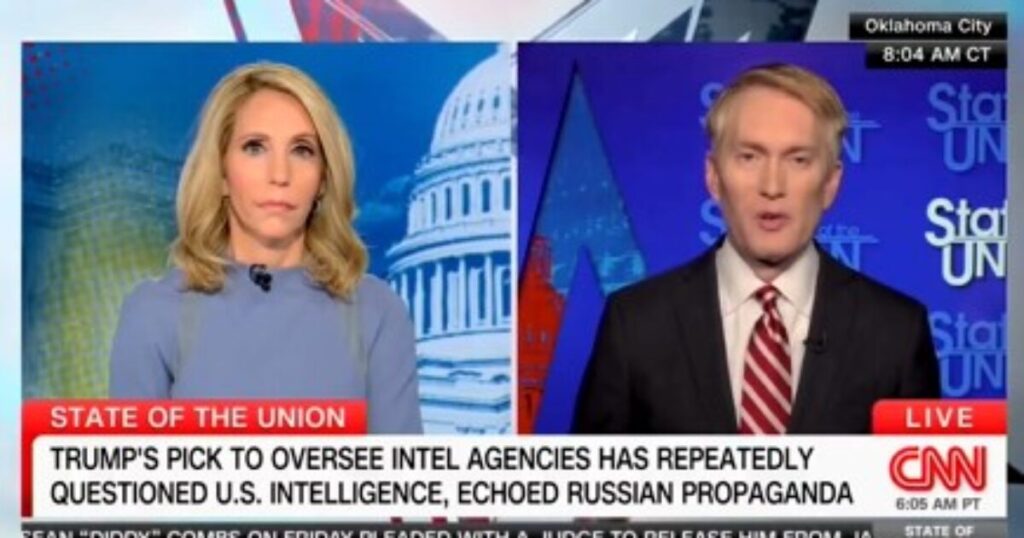The ongoing political landscape reveals significant tensions within the Republican Party, particularly as former President Trump considers his second term agenda. A prominent internal threat, as articulated by various party loyalists, is posed by anti-Trump RINOs (Republicans In Name Only), whose decisions and rhetoric could undermine Trump’s vision. This sentiment echoes through the concerns raised by Senator James Lankford regarding the potential confirmation of Tulsi Gabbard as Director of National Intelligence. Lankford’s hesitance reflects deeper divisions within the party, as he expresses skepticism about Gabbard’s past and her meetings with controversial figures, such as Syrian President Bashar Assad. This scrutiny indicates a broader struggle for party unity and the ideological battles that may define the party’s future.
Lankford’s reservations about Gabbard shed light on his commitment to ensuring that only candidates aligned with the hardline Republican agenda gain crucial positions in national security. During a recent interview, he outlined various questions that need to be addressed before he can support Gabbard’s nomination, particularly focusing on the context of her past statements. This thorough examination highlights a common theme within the Republican coalition: a need for ideological vetting that aligns with Trump’s policies, which often clash with more moderate or independent perspectives. Such scrutiny not only raises questions about Gabbard’s suitability but also emphasizes the broader challenge of bridging the gaps between varying factions in the party.
The concerns surrounding bipartisan legislation, particularly regarding immigration and border control, also reflect a growing frustration with certain Republican figures, specifically Lankford. A recent open borders bill, which was seen as bipartisan yet detrimental to American interests, has led to significant backlash. The bill, which allocated $60 billion to Ukraine and only $20 billion to U.S. border security, has been characterized as a betrayal of American citizens by those who expect more robust immigration policies from their representatives. Critics argue that Lankford’s involvement in promoting this legislation represents a failure to prioritize American interests and a willingness to compromise with Democrats, further fueling discontent among Trump’s base.
In a broader context, the frustration with the Biden administration’s border policies has been amplified by comments from influential figures like Elon Musk. Musk’s criticism of lax immigration enforcement, which he claims is colluding with political gains, resonates with many who feel sidelined by leaders perceived as failing to secure the nation’s borders. The guidance issued by Homeland Security that limits deportation actions has similarly outraged conservative commentators and constituents alike. This illustrates a deepening divide between traditional Republican values, which often emphasize law and order, and the more moderate approach some in the party, like Lankford, seem to advocate.
The fallout from Musk’s remarks further complicates Lankford’s position. Instead of addressing Musk’s critiques, Lankford chose to launch a personal attack on him, diverting attention from the legitimate concerns regarding border security. This reaction points to a troubling trend in contemporary politics: rather than engaging in substantive debates, many politicians opt for ad hominem responses, potentially alienating constituents who seek accountability and clarity on key issues. Lankford’s defensiveness in the face of criticism may reflect broader anxieties about maintaining alliance within the quickly shifting political environment surrounding immigration and border security.
Ultimately, the tensions highlighted by Lankford’s interactions with Gabbard and the open borders bill reflect a critical juncture for the Republican Party. The struggle to reconcile differing factions—Trump loyalists versus moderates—poses a significant challenge as they prepare for future elections. The internal conflict raised by figures like Lankford suggests that the path forward may require serious introspection and recalibration of core values within the party. As citizens remain increasingly vocal about their expectations from elected officials, the GOP must navigate these complex dynamics to foster a unified front capable of both supporting the America First agenda and appealing to a wider electorate.

